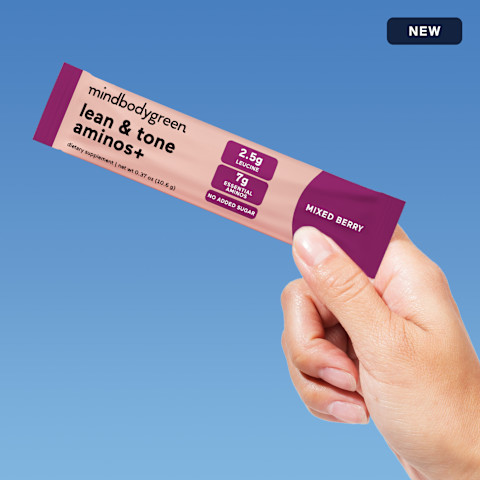5 Benefits To Taking An Amino Acids Supplement (Even If You Eat Enough Protein)
They can help everyone prioritize their muscle health.*


Registered Dietitian Nutritionist
Registered Dietitian Nutritionist
Molly Knudsen, M.S., RDN is a Registered Dietician Nutritionist with a bachelor’s degree in nutrition from Texas Christian University and a master’s in nutrition interventions, communication, and behavior change from Tufts University. She lives in Newport Beach, California, and enjoys connecting people to the food they eat and how it influences health and wellbeing.
Image by Orbon Alija / iStock September 09, 2025 Most of us know protein is essential for building muscle, supporting recovery, and keeping us energized.* But here’s something you might not realize: even if you’re eating a balanced, protein-rich diet, your body may still benefit from an amino acid supplement. Amino acids are the building blocks of protein. They comprise the proteins you eat. So when you digest protein-rich food, your body is then left with these small blocks it can then construct into larger compounds again, like muscle protein, enzymes, and even hormones. While getting them from food is foundational, there’s still a chance you’re not getting the optimal balance of amino acids at a meal or around a workout. So it’s time to consider targeted supplementation of essential amino acids (aka EAAs), including branched-chain amino acids. Traditionally, amino acid supplements were considered a gym bro supplement. And while that’s still true (because yes, they do work), taking an aminos supplement daily can help all active individuals.* Here’s how. 1. Our muscle tissue is dynamic. Meaning: Muscle proteins are simultaneously being broken down and created throughout the day, every day. Muscle protein synthesis (MPS) refers to the muscle creation side of the equation. It’s a set of processes that incorporates amino acids into muscle tissue to produce new muscle proteins. To maintain the muscle mass we currently have, the rate of MPS has to equal the rate of muscle protein breakdown. In order to build muscle mass, the rate of MPS has to outpace that of muscle protein breakdown. But MPS is a process that has to be triggered. The two biggest lifestyle-related triggers are exercise (especially strength training1) and amino acids—particularly leucine. Leucine is one of nine EAAs and one of three BCAAs. Leucine is a key activator of the mTOR pathway2, which controls MPS. But there is a minimum amount of leucine that you need to activate mTOR and stimulate the production of new muscle proteins. And that amount is about 2.5 grams of the amino acid. One 2020 study found that taking a leucine-enriched EAA before or after resistance exercise enhanced activation of the mTOR pathway (compared to a placebo) without increasing muscle breakdown.* And a small study published in the American Journal of Clinical Nutrition found that consuming EAAs with extra leucine3 during endurance exercise (cycling in this case) increases the MPS response more than a standard EAA blend.* 2. Intense exercise (especially strength training, HIIT, or say training for a marathon) cause micro tears in the muscles. This isn’t necessarily a bad thing. It actually is one of the triggers for MPS and for other repair processes to kick off. Problems like muscle soreness and fatigue can arise if that repair doesn’t happen in a timely manner. Amino acids (especially EAAs) provide the muscles with the raw materials needed to repair damage faster, reduce soreness4, and improve recovery time.* 3. EEA can help you build muscle more effectively and overall improve your body composition (alongside exercise).* Researchers recently tested whether leucine could help people hold on to muscle5 while on a calorie-restricted diet. In the study, adults with metabolic health concerns followed a calorie-restricted diet for eight weeks while taking either leucine or a placebo. The leucine group maintained more lean muscle mass (especially men), even as they lost fat.* This is key for people who are interested in weight management or body recomposition. That’s because a calorie-restricted diet can encourage the loss of all weight, even beneficial muscle mass.* And the last thing you want to do is lose muscle or skeletal mass. Maintaining (and building muscle) while losing fat is key to improving your body composition. 4. The goal should always be to get at least 30 grams of protein (if not more) at each meal. And if you choose high-quality sources of protein (like meat, poultry, or fish), that’s easily doable. But life happens. And sometimes our protein intake may fall short or you may fall short on the EAA (especially leucine) if your main source of protein for a meal is coming from plants. One fix for when this happens is to take an EAA supplement around the time of a meal. This ensures that you are hitting the leucine threshold and have the building blocks needed to support your muscles.* These supplements are also nice to have on hand while traveling—when getting a balanced meal and snack is more challenging. 5. As we get older, our muscles become less responsive to dietary protein (it’s a phenomenon called anabolic resistance). That means we often need more protein, and specifically more leucine, to stimulate muscle growth and preserve our lean mass.* An amino acid supplement can provide an easy, efficient way to meet those needs and support healthy aging.*
Supports muscle protein synthesis*
Enhances recovery from all activities*
Promotes a healthy body composition*
Helps you get enough leucine at meals
They’re especially useful with age
Finding the right amino acid supplement
We’ve already divulged our favorite amino acids supplement: mindbodygreen’s new lean & tone aminos+.
Why? It provides a full spectrum of all 9 EAA, including leucine at that desirable 2.5 grams per serving. And it discloses the dose of each amino acid directly on the label, unlike many other amino supplements (that likely fall short on leucine).
Just mix one packet of (berry-flavored) aminos with 8 ounces of water daily
The takeaway
Amino acid supplements can be a great addition to your daily routine, even if you eat enough protein. While the supplement has primarily been used by avid gym-goers in the past, supporting muscle health is relevant to everyone, no matter your current fitness level.*
If you are pregnant, breastfeeding, or taking medications, consult with your doctor before starting a supplement routine. It is always optimal to consult with a health care provider when considering what supplements are right for you.

 JaneWalter
JaneWalter 

































